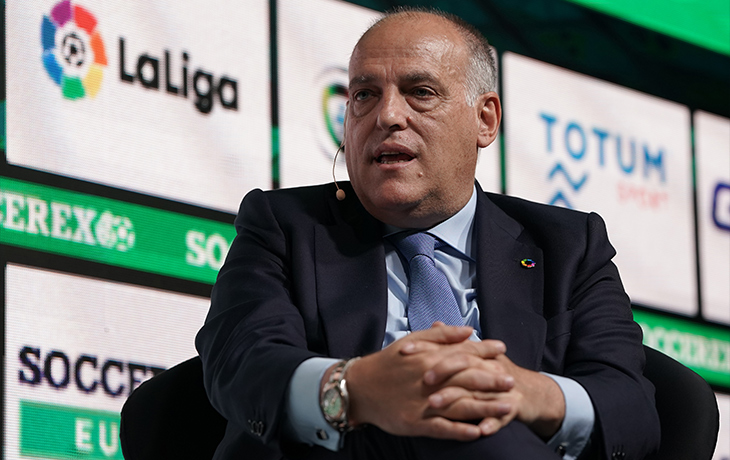The much-discussed development of the Brazilian Football League has resurfaced on the table. In Sao Paulo on March 15, Javier Tebas, the president of “LaLiga,” the organization in charge of the Spanish Championship, met with other executives and officials from Serie A and B teams in the Brazilian Championship. He made a suggestion for the Brazilian league’s concept and administration.
“At LaLiga, we want to contribute to the growth of football and its industry.” With the proposal we are putting forward in collaboration with XP Investimentos and Alvarez & Marsal, we hope to offer all of the knowledge we have accumulated over the years in order to propose a business model that is both financially and administratively sound for betting on the growth of soccer in Brazil. “Today, we bring to Brazilian clubs a plan that combines LaLiga’s best practices and how we became one of the most efficient sports championships in terms of commercial growth and financial stability,” said Javier Tebas, the Spanish league’s president, in a statement after the meeting.
The only major team that did not send a representative to the meeting was Palmeiras. “It is in support of the league, it feels that this is an important step for Brazilian football,” the club declared in an official message to the Terra site, “but it did not see the need to send a representative to this event.”
The project outlined the fundamental parameters for constructing a league in Brazil, addressing problems such as club relationships with the CBF and state federations, game broadcasting rights, and league administration and management. In the next months, other meetings are scheduled, and the concept is likely to develop.
Since a crisis erupted in the Brazilian Football Confederation (CBF) in June 2021, when then-president Rogério Caboclo was dismissed after charges of moral and sexual harassment, there has been discussion of clubs organizing tournaments instead of the entity as well as national teams – such as the Brasileirãoao.
During the above-mentioned crisis, a first meeting took place at the CBF offices, when the top clubs in Brazil established an agreement with the Brazilian football’s highest institution. By the end of the year, the clubs want to have the project formatted.
How did the clubs and the CBF come to an initial agreement?
An agreement was reached for the CBF to forgo coordinating and negotiating agreements (such as television rights) for the first two divisions of the Brazilian Championship and instead delegate this obligation to the teams.
The clubs agreed to keep the weighting of votes for each category in the elections of Brazilian football’s highest entity: the votes of each state’s federations have a weight of 3, the votes of Serie A clubs have a weight of 2, and the votes of Series B clubs have a weight of 1 (clubs from lower divisions do not vote).
In exchange, the CBF agreed to support the league’s formation and surrender control of the events. The fact that the clubs were able to make changes to the candidacies for the presidency of the confederation was also seen as a victory by the clubs. Previously, whoever wanted to run for the presidency of the CBF needed the support of 8 federations and 5 clubs in Serie A, but now there will be 4 federations and 4 clubs respectively.
“The league is outlined under FIFA, Conmebol, and CBF laws. The CBF will not oppose it as long as it follows the sporting order and adheres to the CBF, Conmebol, and FIFA schedules. “It will even be a partner,” CBF President Ednaldo Rodrigues stated at a news conference after the project’s inaugural meeting.
About LaLiga
The National Professional Football League (LaLiga) is a national sports organization in Spain that oversees the country’s two most competitive football divisions. The organization was created in 1984 and is affiliated with the Spanish Football Federation (RFEF), however it operates independently.
Apart from preserving the interests of its member clubs, LaLiga’s major responsibility is to arrange the Spanish Championship, the country’s most significant competition. They are also in charge of securing and negotiating sponsorship deals for the tournament, as well as selling the competition’s television rights.



